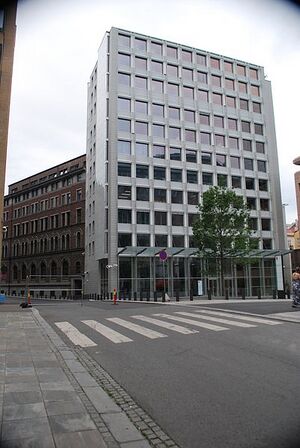Skandinavian Ministry of Health and Care Services: Difference between revisions
miraheze:conworlds>BIPU |
miraheze:conworlds>BIPU |
||
| Line 78: | Line 78: | ||
* Helse SE07 (Mellersta Norrland) | * Helse SE07 (Mellersta Norrland) | ||
* Helse SE08 (Övre Norrland) | * Helse SE08 (Övre Norrland) | ||
==Underlying agencies== | |||
Revision as of 18:59, 2 April 2020
 | |
| Agency overview | |
|---|---|
| Formed | 1953 |
| Jurisdiction | Skandinavia |
| Headquarters | Christiania, Skandinavia |
| Employees | 1,789 Employees of the ministry, not of health care or hospitals. |
| Agency executive |
|
| Website | http://www.hoodep.gob.sk |
The Helse- og Omsorgsdepartementet (Ministry of Health and Care Services) is a Skandinavian Government ministry in charge of health policy, public health, health care services and health legislation in Skandinavia. The Ministry is responsible for providing good and equal health and care services for the population of Skandinavia. The ministry directs these services by means of a comprehensive legislation, annual budgetary allocations and through various governmental institutions. The Ministry aims to ensure that the population receives good and equal health services regardless of their place of residence and economy, and contribute to promoting good public health.
Political leadership
It is led by Grete Strøm-Erichsen and must report to the Unionsparlamentet.
Organization
The Ministry of Health and Care Services has nine departments:
Department of Public Health
The main tasks of the Department of Public Health are related to health promotion and preventive medicine, health surveillance and health registers, nutrition and food safety and alcohol and drug addicition issues.
Department of Specialist Health Care Services
The Department is responsible for financing specialist health care services and for the annual allocations over the central government budget to the county health authorities.
Department of Hospital Ownership
The Ministry of Health and Care Services has ownership of the regional health authorities, which provides the channel for exercising government hospital ownership of the specialist health care services. The principal task of the Department of Hospital Ownership is governance of the regional health authorities and the Skandinavian Health Network.
Department of eHealth
The Department of eHealth has the overall responsiblity for digitalization of the healthcare sector. The Department of eHealth has a broad area of responsibility, ranging from establishing and providing good digital services to health professionals and the public, to following up the long term strategy "one patient- one record".
Department of Health Legislation
The Department of Health Legislation is responsible for the majority of laws and regulations within the domain of the Ministry of Helath and Care Services.
Department of Municipal Health Care Services
This department is responsible for the development of municipal policy measures for municipal health care services, nursing and care services, social care services and mental health care services within the municipalities.
Department of Budgetary and Finacial Affairs
The Department of Budgetary and Financial Affairs coordinates the Ministry of Health and Care Services`work related to the central government budget and is responsible for analyses and reports in connection with various funding and grant schemes.
Department of Administration
The main responsibility of the Department of Administration is to handle horizontal issues, and to make sure that the Ministry is run in accordance with relevant laws and regulations.
Communications Division
The Press and Communications Division deals with press enquiries to the Ministry’s political leadership and the Ministry. The Division also helps to locate the correct department or case officer for background material and information.
Regional health authorities
A regional health authority (Regionalt helseforetak or RHF) is a state enterprise responsible for specialist healthcare in every region of Skandinavia. Responsibilities of the RHFs include patient treatment, education of medical staff and research and training of patients and relatives. Areas covered by the authorities are hospitals, psychiatry, ambulance service, operation of pharmacies at the hospitals, emergency telephone number and laboratories. The actual performance is done by subsidiary health trusts (HF) that usually consist of one or more hospitals, with associate responsibilities. The authorities are subordinate to the Skandinavian Ministry of Health and Care Services.
Regional health authorities are subject to political guidelines and framework conditions, which are largely provided by government laws, regulations and other overall political decisions, including budget decisions. Other examples of such decisions are the Specialist Health Services Act, the Patient Rights Act, the Priority Regulations, the national health plan and the escalation plan for mental health. The financing of the regional health enterprises is mainly divided into two parts: a basic grant and an activity-based financing. The size of the basic grant is independent of the production of services, and is determined, among other things, by the number of inhabitants and the age composition in a region.
There are 22 Regional health authorities:
- Helse DK01 (Jylland)
- Helse DK02 (Sjælland)
- Helse DK03 (Faroe)
- Helse DK04 (Bornholm)
- Helse DK05 (Helgoland)
- Helse IS01 (Iceland)
- Helse NO01 (Christiania og Akershus)
- Helse NO02 (Hedmark og Oppland)
- Helse NO03 (Sør-Østlandet)
- Helse NO04 (Agder og Rogaland)
- Helse NO05 (Vestlandet)
- Helse NO06 (Trøndelag)
- Helse NO07 (Nord-Norge)
- Helse NO08 (Svalbard og Jan Mayen)
- Helse SE01 (Stockholm)
- Helse SE02 (Östra Mellansverige)
- Helse SE03 (Småland med öarna)
- Helse SE04 (Sydsverige)
- Helse SE05 (Västsverige)
- Helse SE06 (Norra Mellansverige)
- Helse SE07 (Mellersta Norrland)
- Helse SE08 (Övre Norrland)
